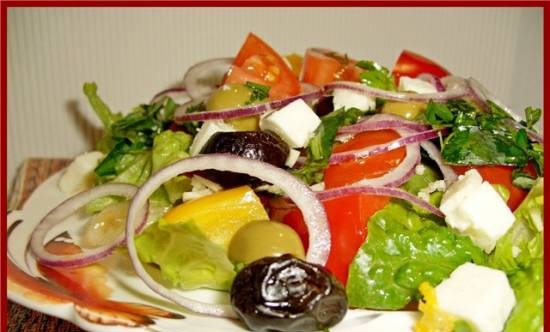|
 Greece, known for its philosophical schools and epicurean sensibility, is also famous for its culinary traditions dating back 4 thousand years. It was in this small country in 330 BC. e. the first culinary encyclopedia was written, whose authorship is attributed to Archestratos. And even earlier, his teacher Theripson wrote the first book on the culinary arts. Greece, known for its philosophical schools and epicurean sensibility, is also famous for its culinary traditions dating back 4 thousand years. It was in this small country in 330 BC. e. the first culinary encyclopedia was written, whose authorship is attributed to Archestratos. And even earlier, his teacher Theripson wrote the first book on the culinary arts.
Greek cuisine as unique in its fullness and vitality as the inhabitants of Hellas, glorified in centuries. The ability to combine, select the taste and aromas of products came from here.
Greek cuisine is characterized by special frugality, based on simple ingredients: fresh crispy vegetables and herbs, natural olive oil, honey, juicy fruits, fresh fish. A separate line is exquisite wines made from numerous grape varieties ripening under the hot Greek sun.
The role of Greek cuisine in the world
International research has revealed the great importance of Greek cuisine for the modern world. Launched in the early 60s of the XX century, the project was supposed to show how eating habits in different countries affect the health and life principles of peoples. The experiment involved countries such as Greece, Italy, Serbia, the Netherlands and others. This project stretched out for thirty years and eventually showed that it is the inhabitants of the Mediterranean, including Greece, who have a lower mortality rate.
All the "secrets" of the health and longevity of these countries were a combination of simple food and regular physical activity. It was from here that the craze for the so-called Mediterranean diet began, the usefulness of which is also recognized by doctors.
Features of Greek cuisine
Traditional Greek cuisine, in addition to wine culture, has a huge number of dishes in its arsenal, the set of which changes depending on the season and region. The culinary habits of the Greeks, formed over many generations, include both elements of common Greek culture and regional characteristics (such as the Cretan diet, island cuisine, Macedonian cuisine).
Food has always been an important part of Greek civilization, from gathering wild greens and finding snails after the rain and ending with sowing seeds and harvesting. Food for the Greeks is part of their identity, bearing the imprint of local traditions, habits and culture. The ancient sowing calendar, which includes many holidays and events, still shapes the daily routine and year of a large part of the inhabitants of Hellas.
Food production
Traveling through the provincial off-road, visitors to the country are faced with an amazing variety of different delicacies. Greece has a network of farms, monastic communities and small businesses, where ancient traditions and advanced technologies are harmoniously intertwined. They still produce their own wines, cheeses, canned meat, marmalade, yogurt, honey, baked bread and even pasta of all shapes and tastes. And cooking recipes are literally inherited and kept in the strictest confidence.
Countless olive trees are grown by whole family businesses, and due to strict rules, the quality of the fruit and oil is always at the highest level.
Today, Greek winemakers produce drinks that Forbes called "the most exquisite and interesting wine brands in the world". At all major competitions, it is the wines of this country that win the largest number of awards.
In addition to popular among the people feta, Greece is famous for its countless varieties of cheese.Almost all regions, islands and even small villages have factories where they make excellent cheese from goat and sheep milk.
Biodiversity allows Greek beekeepers to extract varietal honey from the most unexpected plants: thyme, orange, sunflower, rose hips, chestnut and even the sap of conifers.
Greek pastry chefs skillfully bake sweet masterpieces - Cretan biscuits, sweets of the northern region, and airy candied fruits of the Aegean islands. Honey, nuts, fruits, molasses and even olive oil are used in the baking process.
Handmade pasta (pasta) is the main ingredient in almost any dish of the Greek feast. It is made from flour of a wide variety of cereals, and the taste is simply indescribable.
Meat delicacies are also varied depending on the region. The famous Cretan apaki or smoke-smoked pork, buffalo sausages and many other products have consistently won awards at food exhibitions.
Modern Greek chefs draw inspiration for their recipes from small producers who steadfastly adhere to the ancient traditions of local cooking. Leading restaurants in Greece prefer to use the "slow cook" style, that is, healthy, gradual cooking, as in the old days. The chefs complement this style with unimaginable creative touches in presentation and presentation.
Breakfast is considered to be the most significant meal in Greece. Despite small regional differences, the Greek breakfast is always accompanied by delicious and aromatic dishes, ease of preparation, quality of ingredients. Appetizing pies with cheese filling, aromatic herbal tea, village eggs, honey, homemade canned fruits, olives, vegetables, yogurt - these are the ingredients for a delicious and nutritious Mediterranean breakfast.
The choice of a place for a culinary journey is simply inexhaustible, but in any case, a hearty welcome and a plate filled with fresh products and generous aromas will await the guest.
N. Stroeva
|